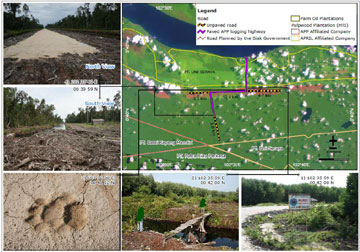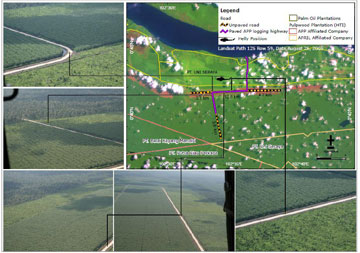Asia Pulp & Paper road destroys rare Sumatra forest
Asia Pulp & Paper road destroys rare Sumatra forest
mongabay.com
March 27, 2008
|
|
Companies linked to timber giant Asia Pulp & Paper (APP) are illegally building a road that runs through highly endangered peatland forest on the island of Sumatra, according to an investigative report published by Eyes on the Forest, a coalition of NGOs in Indonesia.
The road would allow APP and its affiliates to log forests for timber and drain peat soil for the establishment of oil palm plantations. The action would release large amounts of carbon dioxide into the atmosphere from one of the world’s largest contiguous tropical peat swamp forests.
“It is morally reprehensible for one of the world’s largest paper companies to so brazenly ignore Indonesian laws and destroy the natural resources that belong to the people of Riau,” said Teguh Surya of Walhi Riau, one of the Eyes on the Forest partners. “We strongly urge APP to join the ranks of responsible businesses and conduct its operations within the law. Until that time, the world’s paper buyers and investors should stop doing business with APP.”
 February 2008 field survey photos of the APP paved logging highway.
|
The Kampar peninsula area is home the critically endangered Sumatran tigers, whose wild population is estimated to be down to just 400-500, as well as other threatened wildlife.
“Even as our investigators were out surveying the site last month, they came across tiger tracks walking along the APP logging road,” said Nursamsu of WWF-Indonesia and Eyes on the Forest coordinator. “But the tigers of Kampar don’t stand a chance once APP begins logging full-scale and the poachers discover there’s easy access to this critical tiger habitat.”
While APP’s highway will provide access to loggers and oil palm developers, it will not — as promised by administrators — connect two remote villages. Thus the benefits of the project for local people will be limited.
“APP claimed that it was building this state-of-the-art, paved highway for the benefit of the local communities,” said Susanto Kurniawan of Jikalahari. “It’s shameful to see a multibillion-dollar enterprise hiding behind the needs of desperately poor, isolated villagers, who will receive absolutely no benefit from this road but will likely suffer the consequences of APP’s activities.”
The report says that APP has at least three other forest concessions in central Sumatra: Bukit Tigapuluh dry lowland forest block and the Senepis and Kerumutan peatland forests.
The report notes that at least 300,000 hectares of the Kampar peninsula’s 700,000 hectares of forest has been logged since 2002.
“Most of the lost forest was cleared to supply natural forest wood to mills run by APP and its competitor, Asia Pacific Resources International Holding (APRIL), and then planted in acacia plantations to supply the pulp mills. A small part has been converted into oil palm plantations or wastelands,” said a statement from Eyes on the Forest.
Degradation of Indonesia’s peatlands and forest ecosystems is estimated by Wetlands International to release more than 2 billion tons of carbon dioxide per year, making the country the third largest producer of greenhouse gases. A WWF study published last month found that deforestation of nearly 10.5 million acres of tropical forests and peat swamp in central Sumatra’s Riau Province over the past 25 years has generated 3.7 gigatons of carbon dioxide.
Eyes on the Forest report
